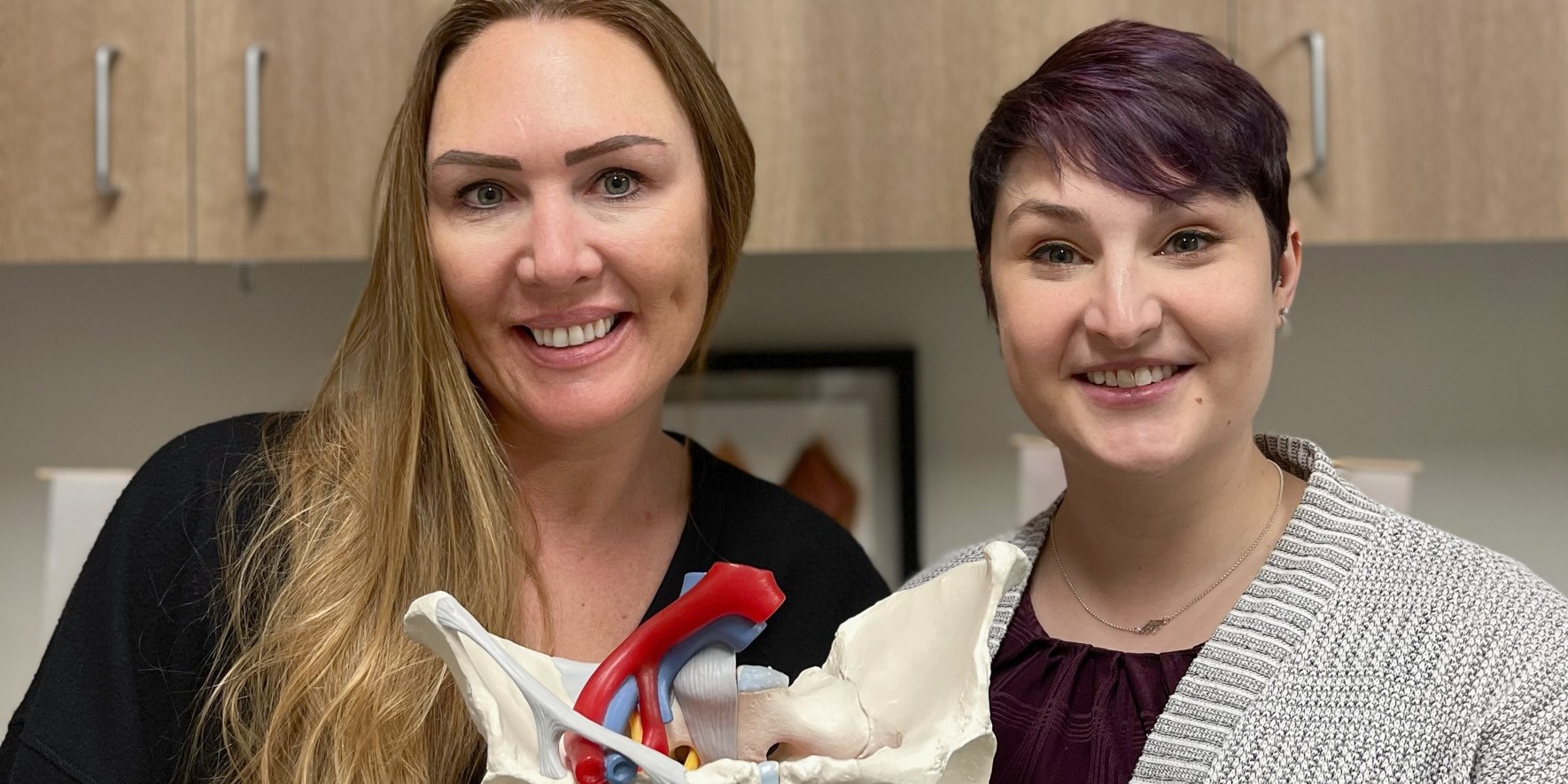Herman & Wallace is excited to announce that Institute founder and instructor Hollis Herman, PT, DPT MS, OCS, WCS, BCB-PMD will be going to Chile this September to teach a comprehensive educational seminar on pelvic floor dysfunction!
This four-day seminar will cover everything from basic terminology to advanced treatment. Much of the seminar will focus on topics taught in our popular Pelvic Floor Series as well as our Pregnancy and Postpartum Courses.

This October, Herman & Wallace is excited to bring a new course, Rehabilitation for Breast Cancer Patients, to White Plains, NY! This course will be taught by Susannah Haarmann, PT, CLT, WCS and Christine Cabelka, MPT, CLT, WCS.
Although pelvic organ prolapse (POP) affects ?50% of women [who] have had children? (according to a Yale School of Medicine Presentation, ?Female Urinary Disorders and Pelvic Organ Prolapse? few realize that childbirth could lead to POP.
Maternal Goddess, an educational support community for soon-to-be and new moms, posted a blog, ?Down and Out ? identifying pelvic organ prolapse.?? This blog examines the importance of early detection and prevention for POP. ?Often, POP can occur without showing any usual symptoms.? However, because there are often so few symptoms, POP is often missed.
POP stems from weakened pelvic floor muscles.? Risk factors include stress on the pelvic floor from childbirth, aging, injury, or heavy lifting.? Pelvic floor exercises and internal treatment can often relieve symptoms; however, in some cases, surgery may be required.
Last Friday, The Atlanticpublished a blog titled ?How Long Can You Wait to Have a Baby??, written by Jean Twenge.? Twenge, herself a woman who entered motherhood in her mid-30s, talks about the panic brought on by a number of articles citing studies which implored women not to wait ?too long?.
Twenge?s article focuses on an article from TIME Magazine, titled ?Making Time for Babies,? written in 2002 that expressed the dangers of waiting too long to have children.? ?Within corporate America, 42 percent of the professional women interviewed?had no children at age 40, and most said they deeply regretted it.?
Amy Stein, MPT, BCB-PMD is a long-time friend of Herman & Wallace.? As the founder of Beyond Basics Physical Therapy, in NY, has been working in pelvic rehabilitation for more than ten years.? Amy Stein?s work outside of the clinic has made her a pioneer in the field.? She co-founded Alliance for Pelvic Pain, an educational retreat for patients, as well as penned several books on pelvic pain and dysfunction.? Her most recent book, Heal Pelvic Pain, is a significant resource for patients and practitioners suffering from or interested in pelvic pain and dysfunction.
This summer, Herman & Wallace began creating products with a new process that we call ?Pre-Funding?.? We want to produce products only if they are useful to therapists, and who better to tell us than you, the pelvic rehab therapist.? The idea behind Pre-Funding is simple: we create an idea for a product (called a Product-Concept offer it for a trial period at a discounted price, and if enough people pre-fund the concept, we proceed with building the product.? This gives us an opportunity to get critical feedback from therapists before the product is developed, thereby allowing us to generate a higher quality product before we send it out. So far, this program has been a big hit!
Every product from our last round of pre-funding was fully funded and built.? This would not have been possible without the participation of therapists who pre-funded.? The feedback was invaluable, enabling us to generate better, more useful products.? We hope to receive the same comments on our future product concepts!
This week we released a new group of product concepts.? The Male Kegel is a tool to help PTs educate male patients about the pelvic floor muscles and how to exercise them.? Self-Stretching the Pelvic Floor illustrates appropriate stretches for different types of pelvic floor dysfunction.? Pregnancy After 30 examines how pregnancy differs for women over thirty, as well as describing the special considerations for over-thirty moms-to-be.? Our Advanced Breathing Techniques product concept is another resource to help therapists teach patients about the respiratory system and different breathing techniques.
For PTs growing or beginning their private practices, treating patients can be the easy part. Because we went to PT school to learn to help patients, not become business men and women, the business side of things is often much more difficult. For therapists trying to promote their practices, using social media can be an effective and free tool for promoting oneself as a clinician.
Advance Healthcare recently published an excellent article on physical therapy and social media, titled “PTs Going Social.” The article touches on many of the benefits of utilizing social media as a method to generate referrals for one’s private practice.
The assumption is that social media can change how businesses advertise and remain relevant in today’s market. Facebook, Twitter, LinkedIn, and even Pinterest offer users the chance to quickly and easily generate content and post it on the web. However, effectively generating content to best promote one’s practice online is no mean feat.
Ulcerative Colitis (UC) dramatically effects a patient’s livelihood. UC is often confused with Crohn’s Disease, another major inflammatory bowel disease. While they do differ in origin, both diseases share similar symptoms, such as blood in a patient’s stool. Furthermore, like Crohn’s Disease, UC tends to affect young people (those between the ages of fifteen and thirty).
Chronic and often severe, UC has no known cure and, in rare cases, can even be life-threatening to the patient.
The Daily Mail posted a news article about Manchester United’s Darren Fletcher, who recently underwent his third surgery for UC. Over the last few years, Fletcher has frequently struggled to stay fit. He has played just thirteen games since December 2011.
Urinary Incontinence (UI) is about as pervasive of a condition as any. Allegro Medical posted a blog recently on “Managing Bedtime Adult Urinary Incontinence.” As they note in their piece, over “one-third of adults wake up at least twice during the night” to urinate.
Nearly everything that involves the uncontrolled outflow of urine is a type of urinary incontinence. Meaning, the underlying cause of Urinary Incontinence can be anything from diet to dehydration to weak pelvic floor muscles.
While UI is most pervasive in men over forty, women of all ages, especially pregnant and postpartum women, are affected. For patients, this can be an exhausting and embarrassing affliction so much so that many do not seek out medical professionals for treatment.
Sacroiliac Joint (SIJ) Dysfunction is a common cause of lower-back and pelvic pain. Although athletes suffer frequently from SIJ Dysfunction, this condition can also affect many others, including and especially pregnant women. The SMART Clinic wrote a blog post about SIJ Dysfunction recently, explaining that, “Women during pregnancy can experience SI Joint pain due to the release of a hormone called “relaxin” that creates instability (unstableness) within the SI joint.”
Nearly 80% of Americans suffer from lower back pain at some point in their lives, and lower back pain “is the most common cause of job-related disability, and a leading contributor to missed work” in the United States. For those who suffer from persistent back pain, SIJ is the confirmed point of origin in 13% of cases.
Frequently painful and sometimes debilitating, SI joint dysfunction is surprisingly easy to develop. Like many other pelvic conditions, everything from bending-over to sitting-down can lead to SI joint dysfunction. Traumas like sports-related injuries and traffic collisions are other frequent precursors. SI joint dysfunction can rarely be addressed by surgery (and, even more rarely, should it.)








































